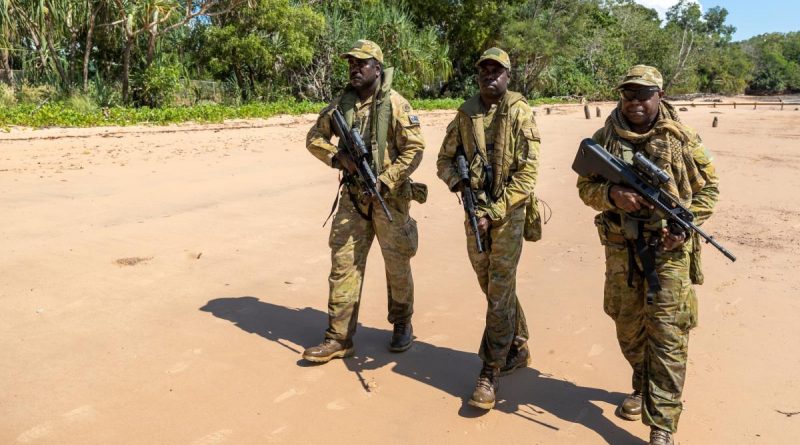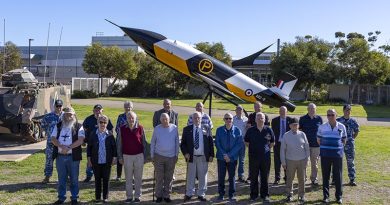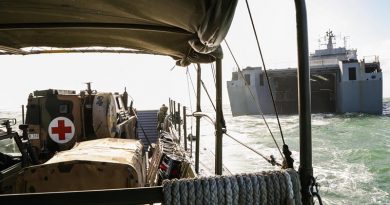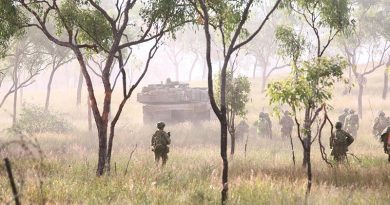Local knowledge protecting the north

When North-West Mobile Force’s (Norforce) Darwin Squadron patrols the Top End, establishing and maintaining relationships is just as important as having the latest high-tech surveillance gear.
CAPTION: Norforce Darwin Squadron soldiers, Private Peter Puruntatameri, left, Private Blake Carter and Private Misman Kris on a beach in Melville Island during a community engagement visit to the Tiwi Islands. Story by Lieutenant Geoff Long. Photo by Leading Seaman Nadav Harel.
In remote communities across the north, many of the adults have either served within Norforce or know someone in the community that has.
Officer Commanding Darwin Squadron Major Alan Bretherton said the communities were the eyes and ears along 1600km of inhospitable coastline and formed a vital element of intelligence in the Top End and as part of Program Vigilant.
“A lot of our information comes as much from our relationships as from physical reconnaissance itself. And that’s important because our relationships throughout the area of operations really enables us to do our job,” Major Bretherton said.
“Secondary to that, it’s also where we recruit from. It’s where we get our soldiers from, and those soldiers provide those critical bush skills for us to do our job.”
Norforce is a culturally diverse unit, recruiting its mostly Reserve soldiers from communities throughout the Northern Territory and the Kimberley Region of Western Australia.
Darwin Squadron is one of four line squadrons within Norforce, along with Arnhem, Kimberley and Centre squadrons.
The squadron’s area ranges from Wadeye across to Pine Creek and up to Maningrida, taking in places including the Daly River region, Jabiru, Tiwi Islands, West Arnhem Land and the Coburg Peninsula.

CAPTION: Army personnel load a small zodiac boat onto a landing craft alongside Darwin Naval Base before departing to conduct surveillance operations off the Tiwi Islands. Photo by Leading Seaman Nadav Harel.
On a recent patrol, the squadron had members from communities in Maningrida, the Tiwi Islands, Goulburn Island and Woodycupaldiya. As a result, wherever they stop there’s a high chance they’ll have connections.
Sergeant Christopher Diamond, a Patrol Commander with Darwin Squadron, said local knowledge was a vital asset in Norforce’s role in maintaining awareness of Australia’s northern regions.
“Our Indigenous soldiers have the ability of local bushcraft and survival, mostly without training. They also know when something’s out of place in their area. So something I may not notice, they definitely pick up on,” Sergeant Diamond said.
Patrolman Private Peter Puruntatameri lives in Wurrumiyanga on Bathurst Island, north of Darwin.
Private Puruntatameri works in forestry when he’s not serving with Norforce, and he said knowing the local environment and conditions was a key asset on surveillance patrols.
“We’re looking for anything suspicious; looking to see if anything has been moved around or is out of place,” Private Puruntatameri said.
They look at beach landing sites for signs of use and the subsequent tracks away from those areas, while for air landing sites they look for evidence of frequent or recent use.
Some of the activities that they’re looking for in Australia’s north include smuggling, poaching, the importation of controlled substances, illegal maritime arrivals and illegal fishing.
Norforce also works in concert with other agencies, including Australian Border Force, Northern Territory Police, local ranger groups and Fisheries to share information for the protection of country.
CAPTION: Army personnel secure a small Zodiac boat on Melville Island during a community engagement visit to the Tiwi Islands off the Northern Territory coast. Photo by Leading Seaman Nadav Harel.
.
.

.
.





